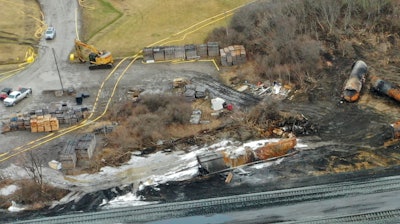
WASHINGTON (AP) — Congress responded to the fiery train derailment in eastern Ohio earlier this year with bipartisan alarm, holding a flurry of hearings about the potential for railroad crashes to trigger even larger disasters. Both parties agreed that a legislative response was needed.
Yet six months after life was upended in East Palestine, little has changed.
While President Joe Biden and former President Donald Trump have praised a railroad safety bill from Ohio Sens. Sherrod Brown, a Democrat, and JD Vance, a Republican, the Senate proposal has also encountered resistance. Top GOP leaders in Congress have been hesitant to support it, and the bill has faced some opposition from the railroad industry, which holds significant sway in Washington.
As a result, it remains an open question whether the derailment that shattered life in East Palestine will become a catalyst for action. And for Republicans, the fight poses a larger test of political identity, caught between their traditional support for industry and their desire to champion voters in rural America.
"These rail lines pass frequently through Republican areas, small towns with a lot of Republican voters," Vance told The Associated Press. "How can we look them in the eye and say, we're doing a good job by you? If we choose the railroads over their own interests, we can't."
In East Palestine, a village of approximately 5,000 people near the Pennsylvania state line, the railroad has reopened both its tracks in the area but the cleanup continues. Norfolk Southern estimates that its response to the derailment will cost at least $803 million to remove all the hazardous chemicals, help the community and deal with lawsuits and penalties related to the derailment.
But residents still worry about the long-term health effects. Many are looking to Congress to act, hoping it will prevent another community from enduring the trauma, fear and upheaval they have endured.
Jami Wallace, who has lived in East Palestine for 46 years along with her extended family, has helped lead a community group called the Unity Council to represent residents' concerns and push for government action.
"If our legislators don't take East Palestine as an example of some of the reforms that need to be in the regulations that need to be put on, you know, the railroad industry, then they're fools," Wallace said. "Again, we don't want to suffer for nothing."
Rail labor groups say the widespread cuts the industry has made in the name of efficiency in recent years have made railroads riskier, so they believe reforms are needed to reduce the more than 1,000 derailments that happen every year because just one can be disastrous.
"There have been more than 60 high-profile derailments since East Palestine, including multiple in Ohio, Pennsylvania, and Montana," said the Transportation Trades Department coalition that includes all the rail unions. "Through it all, freight rail companies have maintained their fundamental disregard for public safety. Safety is just a buzzword to the railroads."
Vance, a freshman senator who rose to conservative fame with his 2016 memoir "Hillbilly Elegy," said he is counting on a few more Republican senators to back the bill before it comes to a vote. Majority Leader Chuck Schumer, D-N.Y., has already placed the bill at the top of the agenda for the fall.
But both Vance and Brown acknowledge their legislation faces an even steeper climb in the Republican-controlled House. GOP leaders there want to wait until the National Transportation Safety Board completes its investigation of the derailment — which will likely not happen until next year — before taking action. The NTSB in a preliminary report found fault with an overheated wheel bearing.
But a contingent of Ohio House lawmakers, led by Democrat Rep. Emilia Sykes and Republican Rep. Bill Johnson, whose district includes East Palestine, want action now.
"Let's hit while the iron is hot," Johnson said.
Both the House and Senate bills would increase fines for safety violations, require more inspections and increase the number of trackside detectors that monitor for overheated wheel bearings. In one significant difference, the Senate bill would require that most freight trains have two-person crews, while the House bill would not.
Railroads have spoken out against the two-person crew requirement and urged Congress to wait for the final NTSB investigation to pass any new regulations.
The industry has also stepped up its lobbying this year. In the first three months of 2023, industry groups spent a combined $7.1 million on lobbying — a roughly $1.8 million increase from the $5.3 million it spent in the previous three months.
The railroads say there isn't any data to show one-person crews are riskier than two-person crews. They also point out that the East Palestine train actually had three crew members aboard when it derailed.
Sen. John Thune, who is currently the Republican whip but in 2003 and 2004 worked as a lobbyist for Dakota, Minnesota & Eastern Railroad, said in a Senate committee debate that it was important to hold Norfolk Southern, whose train derailed on Feb. 3, accountable for the derailment. He also voiced support for "pragmatic reforms." But Thune ultimately opposed the bill from Vance and Brown and cautioned against the "cost of regulation" on railroads.
"There is not much in the proposed legislation that would address the derailment in East Palestine based on what we know so far," Thune said.
Railroads have a long history of resisting new regulations, and an industry group has already filed a lawsuit challenging some new state rules Ohio passed after the derailment. It maintains that any new regulations should be based on data that proves the rules would actually make railroads safer.
"We've always been encouraging members of Congress to take their time to make sure they have the facts and the data and the technical analysis coming from NTSB and other regulators so that we can have a fact-based conversation," CSX CEO Joe Hinrichs said. "All of us want safety in the rail network and in our communities."
As the bill proponents make a push in the coming months, Brown said he was counting on help from residents directly impacted by the February derailment.
"The area of the state this happened in is a very conservative, Republican part of the state. But I am their ally. They know it. They're my allies in this," said Brown, who is expected to face a tough reelection race next year. "They put pressure. They don't care about partisan politics."





















